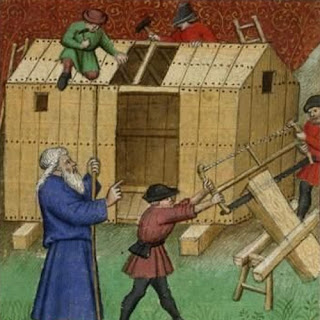First, we need to know the currency:
1 pound (£) = 20 shillings (s)1 shilling = 12 pence (d)
1 pence (penny) = 4 farthings
Additionally, 1 crown was only 5 shillings, and 1 mark = 13 shillings and 4 pence
The £, s, d symbols are from French Livre, sou, and denier, which are in turn from Latin liber, solidus, and denarius.
Lists of wages are not readily available; the information must be gleaned from various sources found in various time periods. For comparison's sake, I will keep to wages in the 1300s.
An unskilled laborer in 1300 could make £2/year, or 40s; by 1390 that had doubled to £4.
A manservant in 1390 could make 20s/year; a maidservant half that, 10s.
A swineherd made as much as the maidservant.
In 1351, as the Black Death was reducing the labor pool, a mason could earn 107s/year; by 1390, that had risen to £8, or 160s!
A carpenter in 1300 could make 53s/year. By 1351 (Black Death killing off workers!), that had risen to 80s/year, and a master carpenter could earn 107s. A little later, in 1400, the carpenter's apprentice would be worth 40s/year.
The Medieval Sourcebook has a lot of pricing information ranging from the 11th to 15th centuries, if you'd like to explore further.


